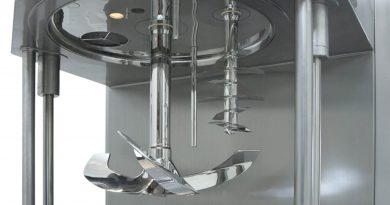Plasma-Derived Therapies Manufacturing Plant, 2030, Takeda, Osaka, Japan
Takeda plans to invest approximately 100 Billion Yen ( 762,330,000 Million USD) to construct a new manufacturing plant for plasma-derived therapies (PDTs) in Osaka, Japan. The fruition of the announcement would represent Takeda’s biggest investment to date for expanding manufacturing its capacity in Japan.
This investment reflects Takeda’s values-based approach of putting patients first and delivering on its commitments across the company’s patient, people and planet imperatives, underpinned by data and digitalisation. It also aligns with Takeda’s capital allocation policy of “Investing in Growth Drivers”, through disciplined and focused investments in value-creating business opportunities, enabling Takeda to establish a world-class end-to-end manufacturing facility for PDTs at its Juso, Osaka plant.
The largest Plasma-Derived Therapies Manufacturing Plant in Japan to be Operational by 2030
The new cutting-edge facility will be the largest of its kind in Japan and is expected to be operational by around 2030. The new plant increases the capacity of Takeda’s current plasma manufacturing site in Narita, Japan almost five-fold and will enable Takeda to serve more patients in Japan sustainably, as well as add incremental capacity to its global manufacturing network.
Takeda’s Plasma Therapy Facility will have the Latest Automation and Advanced Digital Technologies
The facility will be built to the highest global manufacturing standards, including the latest automation and advanced digital technologies. It will be a fully integrated plant, comprising of teardown, fractionation, purification, filling, finishing capabilities as well as a cold storage warehouse. The design will be environmentally friendly to support Takeda’s goal of achieving net-zero greenhouse gas emissions related to operations including scopes 1 and 2 before 2035. Takeda’s existing Narita plasma manufacturing site will continue day-to-day operations until at least the end of the decade, with continued necessary investments for maintenance.
Milano Furuta, president of the Japan Pharma Business Unit at Takeda said:
“Takeda has delivered plasma therapies to meet the needs of patients in Japan for more than 70 years. This new investment will strengthen our ability to continuously and reliably bring high-quality PDTs to a growing number of patients in Japan and worldwide. We will engage in discussions with the Ministry of Health, Labour and Welfare to ensure we are contributing to sustainable patient care in an area of high unmet need in Japan.”
Thomas Wozniewski, global manufacturing & supply officer at Takeda, added:
“We are pleased to make this investment in Japan, demonstrating our commitment to our fast-growing PDT business and to our home country.”
“Japan will play an even more critical role in our global manufacturing network, contributing to supply chain resilience globally. The new facility will provide a plasma fractionation capacity of more than 2 million liters per year. The company will unleash the power of automation and digitalization to deliver high quality products to patients reliant on PDTs, including those with diseases for which there are no alternative treatments.”
Takeda has made continuous investments to strengthen its production capabilities in Japan to deliver innovative medicines to patients locally and globally, including Leuplin®, an LH-RH agonist; Alofisel®, a cell therapy line that requires highly advanced manufacturing technology; and the influenza pandemic (H5N1) and COVID-19 vaccines, which are subsidized by the Japanese government. Takeda has also built a modern production line for ENTYVIO® at the Hikari site, which is expected to become operational later this year.
The demand for PDTs has grown significantly over the last 20 years as diagnoses of rare diseases and earlier treatment of complex chronic diseases have improved. Patient needs for PDTs in Japan are expected to grow significantly in the coming years and Takeda intends to register up to five global products and new indications over the next five years in Japan, with discussions continuing with the authorities looking at ways to secure reliable supply and enable more patients to have continuity of care.
Giles Platford, president of the Plasma-Derived Therapies Business Unit at Takeda stated:
“We continue to prioritize investment in the long-term strategic growth of our global PDT business and are excited about this opportunity to contribute further to meeting growing patient needs with a broader portfolio of differentiated products, both domestically and worldwide.”
Takeda expects that there will be no financial impact on its consolidated operating results for the fiscal year ending March 31, 2023 (FY2022), as a result of this investment.
About Plasma-Derived Therapies
Plasma-derived therapies are used to treat patients suffering from a variety of conditions, including rare and complex chronic immunodeficiency diseases. While they address areas of high unmet medical need and there is growing demand in Japan, timely diagnosis and treatment with immunoglobulin (IG) is currently much lower than in other parts of the world. Efforts are underway with the regulatory authorities to raise the standard of care and bring more of the global PDT portfolio to Japan over the next decade to make more treatments available to more patients.
About Takeda
Takeda is a global, values-based, R&D-driven biopharmaceutical leader headquartered in Japan, committed to discovering and delivering life-transforming treatments, guided by our commitment to patients, our people and the planet. Takeda focuses its R&D efforts on four therapeutic areas: Oncology, Rare Genetics and Hematology, Neuroscience, and Gastroenterology (GI), with expertise in immune and inflammatory diseases. We also make targeted R&D investments in Plasma-Derived Therapies and Vaccines. We are focusing on developing highly innovative medicines that contribute to making a difference in people’s lives by advancing the frontier of new treatment options and leveraging our enhanced collaborative R&D engine and capabilities to create a robust, modality-diverse pipeline. Our employees are committed to improving the quality of life for patients and to working with our partners in health care in approximately 80 countries and regions.
For more information, visit www.takeda.com.





